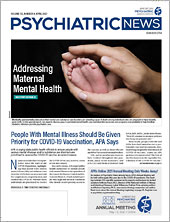Disrupted insulin sensitivity in childhood and adolescence may be a shared risk factor for cardiometabolic disorders and psychosis in adulthood, a study in JAMA Psychiatry has found. The study also found that a major increase in BMI around puberty may indicate a greater risk for adult depression.
“Our findings may begin to challenge the received wisdom that the physical comorbidity associated with depression and psychosis is secondary to the mental disorder,” lead author Benjamin I. Perry, M.B.B.S., M.Sc., told Psychiatric News. Perry is a National Institute for Health Research (NIHR) doctoral research fellow in the Department of Psychiatry at the University of Cambridge in England. “Our results suggest the possibility that early subtle signs of cardiometabolic dysfunction may be detectable before the onset of the psychiatric disorders.”
Perry and colleagues examined data from people aged 1 to 24 years in the Avon Longitudinal Study of Parents and Children (ALSPAC), a prospective study of approximately 15,000 British people. They obtained data on fasting insulin levels for 5,790 people measured at ages 9, 15, 18, and 24 years and BMI for 10,463 people measured at 1, 2, 3, 4, 7, 9, 10, 11, 12, 15, 18, and 24 years.
“Previous research has mostly included single-point measures of cardiometabolic markers, yet repeat measures of these markers provide much greater resolution into potential underlying biological pathways,” Perry said.
Study participants with persistently high fasting insulin levels from age 9 onward—roughly 3% of the study sample—had roughly five times the odds of being classified as having a mental state that put them at risk of psychosis and more than three times the odds of having a psychotic disorder at age 24. There was no evidence that fasting insulin levels were associated with depression.
“It is already known from meta-analytic studies that people with first-episode psychosis, who are generally relatively young and without prior prolonged use of antipsychotic medications, have a higher prevalence of insulin resistance than matched controls,” Perry explained. “Our results therefore suggest that early signs of impairment to glucose-insulin homeostasis may in fact be detectable long before the first episode of psychosis, at least in some individuals.”
There was no evidence that BMI was associated with an increased risk of psychosis. However, people who experienced a major increase in BMI starting at puberty onset had roughly 4.5 times the odds of having a depressive episode at age 24, a result that persisted even after the researchers adjusted for childhood behavioral and emotional problems. This suggests that the increased risk of adult depression may stem from the physical or physiological changes of a sudden increase in BMI at puberty, rather than any preexisting childhood depression that may have led to weight gain as the participants entered adolescence.
Yet there may be more to it than that, said Perry. “The environment may also play an important part. Children at that age may be susceptible to traumatic life events, for example bullying, which may increase the risk of weight gain and longer-term depression.”
William W. Eaton, Ph.D., a professor in the Department of Mental Health at Johns Hopkins Bloomberg School of Public Health in Baltimore, noted the usefulness of drawing data from the ALSPAC cohort.
“The important thing is that [the researchers] focused on a range of ages early in the lifespan and used data from what is the most important cohort study on the planet, in many ways, because it starts with conception and continues for decades,” said Eaton, who was not involved in the research.
“The complexity of risk factors and the way they combine over the life span point strongly to the need for a national conception-to-death cohort study that includes medical and psychiatric illness, one that is on the scale of 100,000 people over 100 years.”
The study was supported in part by NIHR, the Wellcome Trust, and the Medical Research Council. ■
“Longitudinal Trends in Childhood Insulin Levels and Body Mass Index and Associations With Risks of Psychosis and Depression in Young Adults” is posted
here.



